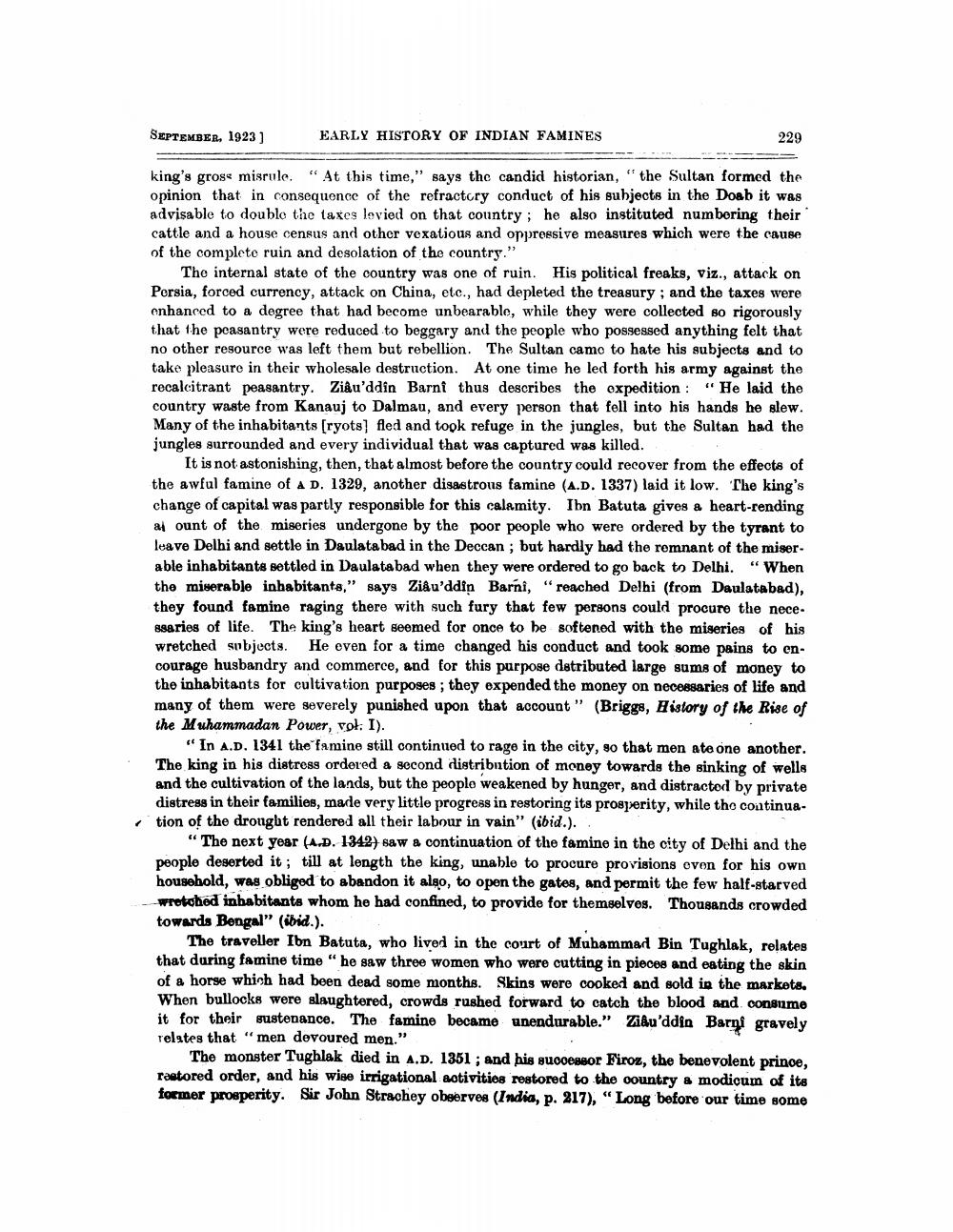________________
SEPTEMBER, 1923)
EARLY HISTORY OF INDIAN FAMINES
229
king's gros misrule. "At this time," says the candid historian," the Sultan formed the opinion that in consequence of the refractory conduct of his subjects in the Doab it was advisable to double the taxes lovied on that country; he also instituted numbering their cattle and a house census and other vexatious and oppressive measures which were the cause of the complete ruin and desolation of the country."
The internal state of the country was one of ruin. His political freaks, viz., attack on Persia, forced currency, attack on China, etc., had depleted the treasury; and the taxes were enhanced to a degree that had become unbearable, while they were collected so rigorously that the peasantry were reduced to beggary and the people who possessed anything felt that no other resource was left them but rebellion. The Sultan camo to hate his subjects and to take pleasure in their wholesale destruction. At one time he led forth his army against the recalcitrant peasantry. Zi&u'ddin Barnt thus describes the expedition : "He laid the country waste from Kanauj to Dalmau, and every person that fell into his hands he slew. Many of the inhabitants (ryots) fled and took refuge in the jungles, but the Sultan had the jungles surrounded and every individual that was captured was killed.
It is not astonishing, then, that almost before the country could recover from the effects of the awful famine of a D. 1329, another disastrous famine (A.D. 1337) laid it low. The king's change of capital was partly responsible for this calamity. Ibn Batuta gives a heart-rending at ount of the miseries undergone by the poor people who were ordered by the tyrant to leave Delhi and settle in Daulatabad in the Deccan ; but hardly had the remnant of the miserable inhabitante settled in Daulatabad when they were ordered to go back to Delhi. "When the miserable inhabitants," says Ziâu'ddin Barni, "reached Delhi (from Daulatabad), they found famine raging there with such fury that few persons could procure the nece. ggaries of life. The king's heart seemed for once to be softened with the miseries of his wretched subjects. He even for a time changed his conduct and took some pains to encourage husbandry and commerce, and for this purpose detributed large sums of money to the inhabitants for cultivation purposes; they expended the money on necessaries of life and many of them were severely punished upon that account" (Briggs, History of the Rise of the Muhammadan Power, vol. I).
"In A.D. 1341 the famine still continued to rage in the city, so that men ate one another. The king in his distress ordered a second distribution of money towards the sinking of wells and the cultivation of the lands, but the people weakened by hunger, and distracted by private distress in their families, made very little progress in restoring its prosperity, while the coutinuation of the drought rendered all their labour in vain" (ibid.).
“The next year (A.D. 1342) saw a continuation of the famine in the city of Delhi and the people deserted it; till at length the king, unable to procure provisions even for his own household, was obliged to abandon it also, to open the gates, and permit the few half-starved wretched inbabitants whom he had confined, to provide for themselves. Thousands crowded towards Bengal" (ibid.).
The traveller Ibn Batuta, who lived in the court of Muhammad Bin Tughlak, relates that during famine time" he saw three women who were cutting in pieces and eating the skin of a horse which had been dead some months. Skins were cooked and sold in the markets. When bullocks were slaughtered, crowds rushed forward to catch the blood and consume it for their sustenance. The famine became unendurable." Zidu'ddin Bargi gravely relates that "men devoured men."
The monster Tughlak died in A.D. 1351 ; and his successor Firoz, the benevolent prince, raetored order, and his wise irrigational activities restored to the country a modicum of its former prosperity. Sir John Strachey observes (India, p. 217), "Long before our time some




